Innocence Engulfed
Britten's chamber operas: The Turn of the Screw at Waterperry, British Youth Opera's The Rape of Lucretia
Innocents at play: Beth Burge (Flora), Ivo Clark (Miles) Picture © Graham Turner
Benjamin Britten’s ‘invention’ of the chamber opera started life with The Rape of Lucretia at Glyndebourne in 1946, the year after he had announced himself as a promising ‘grand opera’ composer with Peter Grimes at Sadler’s Wells. Despite Grimes’s success, Britten did not complete another big opera until 1951, when Billy Budd was premiered at Covent Garden.
Between these towering masterpieces - both now firmly established in the international repertoire - the composer founded the English Opera Group to tour small-scale opera with an orchestra of 13 players, compact casts and no chorus. The Rape of Lucretia, Albert Herring and his arrangement of The Beggar’s Opera were all premiered in quick succession at Glyndebourne (1946 - 48), which in the immediate post-war era could not afford its own productions. This proved to be a short-lived alliance. After the composer fell out with Glyndebourne’s then owner, John Christie, his operas disappeared from the festival’s repertoire until 1981 - almost 20 years after Christie’s death and five after Britten’s.
Even though big houses occasionally programme his small-scale works, they have become staple fare for fringe companies, college productions and festivals promoting young talent. Britten’s practicality as a ‘composer for use’ has provided fertile ground for bright youngsters in the strikingly individual parts he wrote for his partner, Peter Pears, and a close-knit ensemble of supporting artists. This summer’s productions of The Turn of the Screw by the Waterperry Opera Festival and The Rape of Lucretia by British Youth Opera showcased not just how dramatic Britten’s operas can be in the right hands, but how sympathetic his vocal writing is for young singers in intimate, sometimes unexpected spaces.
Waterperry’s staging took place in the ‘folly’ that is its Amphitheatre - a Roman-style structure in Oxfordshire gardens, with singers performing ‘in the round’ and the chamber ensemble seated on a covered platform above the stage.
Much of Myfanwy Piper’s libretto, based on the Henry James novella, suggests a dusk to twilight ambience, making it difficult to stage al fresco in daylight, but Garsington pointed the way in 2017 and 2022.
“I’ll stand by you”: Georgia May Ellis (Mrs Grose), Charlotte Bowden (Governess) Picture © Graham Turner
At Waterperry, Rebecca Meltzer contrived a spook factor in the early scenes despite the sunshine, thanks to her detailed direction of the singers and some simple visual effects devised by her designer, April Dalton: an alcove with sinister-looking objets trouvés, a back-stage area filled with dry ice to suggest the ghostly realm of Quint and Jessel, an ever-present piano, which was played by the Narrator (sung by Robin Bailey) during the introductory Prologue. Britten and Piper hint that this Narrator is the children’s ‘Guardian in London’, but Bailey wore the same costume for Quint, a device that captured the ambiguity of so much of the opera’s drama. His ‘ghost’was frighteningly tangible (as Britten surely intended him to be) and he sang with a bright angular tenor, guilefully insinuating the spectral character’s vanity, arrogance and dangerous corruption.
Charlotte Bowden’s limpid-toned yet neurotic Governess was more than a match: she came across as a well-meaning fantasist, possibly even inventing her ‘dear ones left at home’ and imagining ghosts that the housekeeper Mrs Grose (an unusually youthful portrayal by George May Ellis, sympathetically sung) simply can’t see. Bowden’s tussle with Sian Dicker’s Miss Jessel (sung with dramatic soprano potential) became a psychological tug-of-war, as did the final encounter with Bailey’s frighteningly possessive Quint. The cast was completed by Beth Burge’s Flora, properly resentful at the preferential treatment meted out to Ivo Clark’s sweetly sung Miles. Bertie Baigent and a fine group of young instrumentalists contributed a gripping account of a score which, Berg-like, Britten cast as a set of variations. It’s this structural device that makes The Turn of the Screw the most indestructible of his small-scale operas — and it was much more than that in this riveting, exceptionally well-sung account. Bravi tutti!
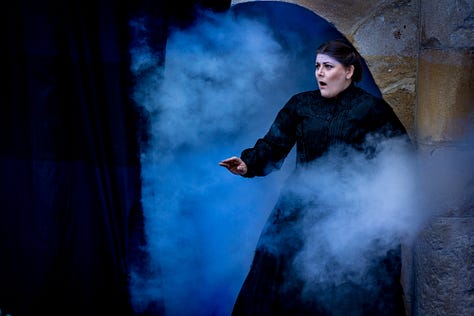
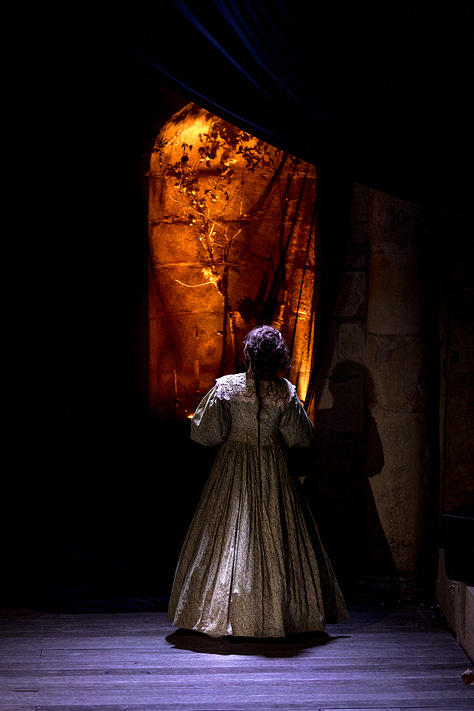
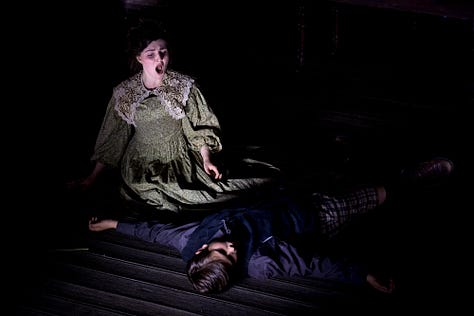
Left to right: Sian Dicker (Miss Jessel); Bowden (Governess); Bowden, Clark (Miles) Pictures © Graham Turner
The Rape of Lucretia has always been problematic. After the universal success of Grimes, Lucretia must have seemed a strange change of direction, and in the intervening years Ronald Duncan’s libretto has proved a moral time-bomb. The subject matter, based on a French symbolist play, is laced with now-unfashionable aperçus which may have been acceptable to Duncan’s generation but no longer are: the racism, misogyny and class snobbery of the Roman and Etruscan generals stick in the craw today, and the gleeful voyeuristic relish with which the Male Chorus describes the Rape to the audience is surely no longer acceptable.
Alexandria Moon (centre), Emmeline Tovey (Bianca, left) Harriet Cameron (Lucia, right) Picture © Ali Wright
In her marvellous British Youth Opera staging, Talia Stern did not flinch from exposing Duncan’s prejudices. Indeed she made a feature of portraying the Male and Female Chorus not as observing bystanders (as they claim in the text) but male/female partisans in the drama. She also brilliantly suggested the seething anger of Lucretia’s two handmaidens, Bianca and Lucia - the latter experiencing something of an enraged meltdown at the end, glaring at the Chorus soloists with their vapid Christian platitudes.
The staging made resourceful use of one of the quirkiest spaces in which I’ve attended opera - the shaft to the old Rotherhithe Tunnel at the Brunel Museum, now a tiny 70-seat venue, more ideally suited to cabaret or stand-up comedy, I suspect. The sheer claustrophobia of the venue added to the atmosphere of the performance, though its boomy acoustic was probably less helpful to the players of the South Bank Sinfonia under Thomas Payne’s expert direction than it was to the singers. Stern showed the men to be not all villains, just casual misogynists. And because her two casts were youthful, even the Prince of Rome’s toxic masculinity seemed less offensive than usual: Tigran Kakhvejyan’s powerful baritone perhaps more “panther virile” than William Jowett’s - but the latter was a charmer, a natural Sid in Albert Herring, perhaps, looking barely out of his teens.
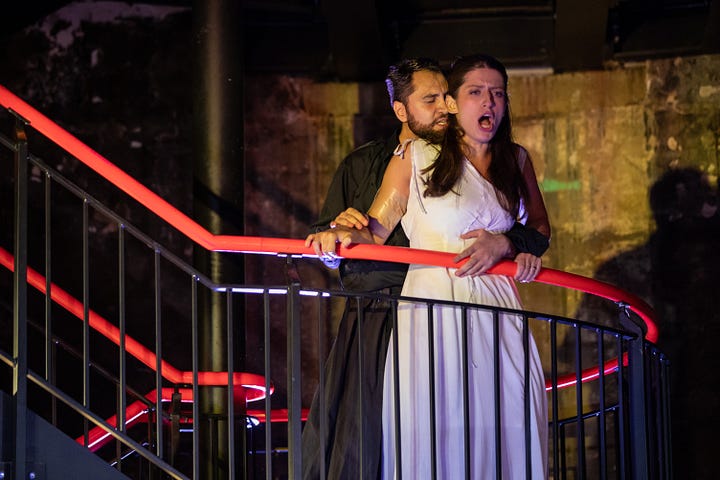
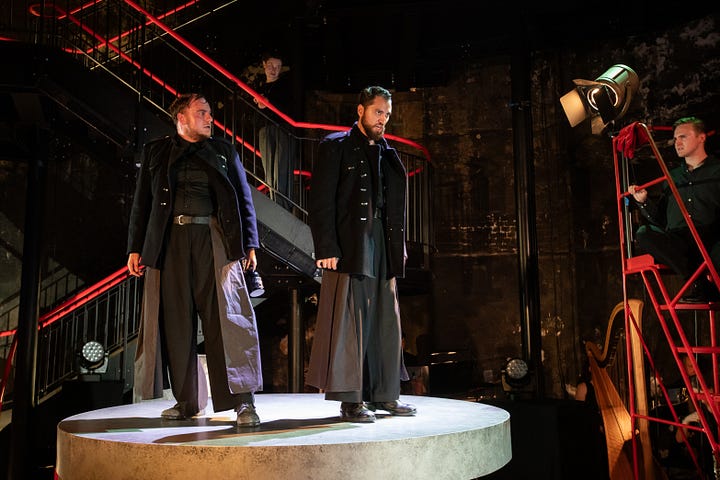
Tigran Kakhvejyan (Tarquinius), Moon (Lucretia); Ross Cumming (Junius) Kakhvejyan Pictures © Ali Wright
With all but the role of Lucretia’s stoical husband, Collatinus (Mica Liberia-Smith) double-cast, the singers projected Britten’s music with an in-your-face directness - though Duncan’s words were not always audible (perhaps for the better). The alternating Lucretias Alexandra Moon and Cecilia Yufang Zhang offered contrasting mezzo timbres, the former plusher, the latter brighter, almost soprano-ish, while both Male Choruses handled their music with a vocal bravura astonishing in such young singers - Alfred Mitchell strikingly reminiscent of photographs of the young Peter Pears (for whom the music was written), Samuel Horton more overtly an ‘Etruscan’ partisan and a bit of a yob with his shaven head. As Junius, Ross Cumming struck me as a baritone with a possible Verdian/Wagnerian future, but in the alternative cast, George Roberts’ more sinewy vocal character was by no means outclassed. Both Female Choruses, Victoria Armilotta and Hannah O’Brien, are singers I’d like to hear again in meatier roles. All four of the maids could step into professional productions tomorrow.
Here, then, were two casts shedding subtly different light on Britten’s shadowy less-than-masterpiece. I confess I have rarely been as gripped by the music as I was on both occasions.
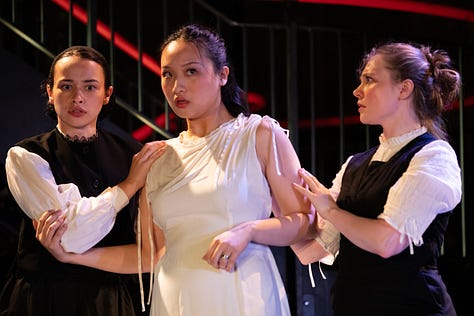
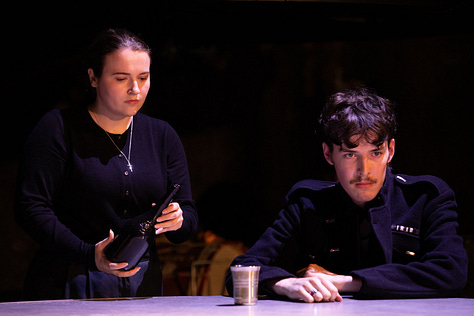
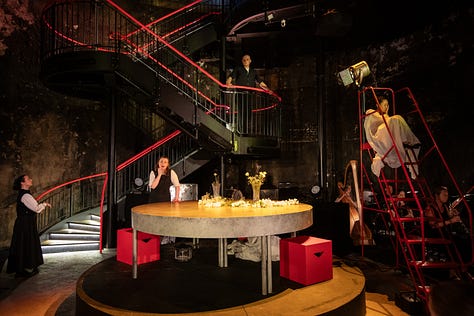
British Youth Opera’s Lucretia: pictures © Ali Wright
Casts & Creative Teams
The Turn of the Screw - Waterperry Opera Festival
Governess Charlotte Bowden Peter Quint/Prologue Robin Bailey Mrs Grose Georgia May Ellis Miss Jessel Sian Dicker Miles Ivo Clark Flora Beth Burge
Conductor Bertie Baigent Director Rebecca Meltzer Set/Costumes April Dalton Lighting
Performance attended: 9 August 2024
The Rape of Lucretia - British Youth Opera
Lucretia Alexandria Moon/Cecilia Yufang Zhang Tarquinius Tigran Kakhvejyan/William Jowett Male Chorus Alfred Mitchell/Samuel Horton Female Chorus Victoria Armillotta/Hannah O’Brien Collatinus Mica Liberta-Smith Junius Ross Cumming/George Robarts Bianca Emmeline Tovey/Julia Solomon Lucia Harriet Cameron/Anna Gregg
Conductor Thomas Payne Director Talia Stern Set/Costumes Hazel McIntosh
Performances attended 12/15 August 2024




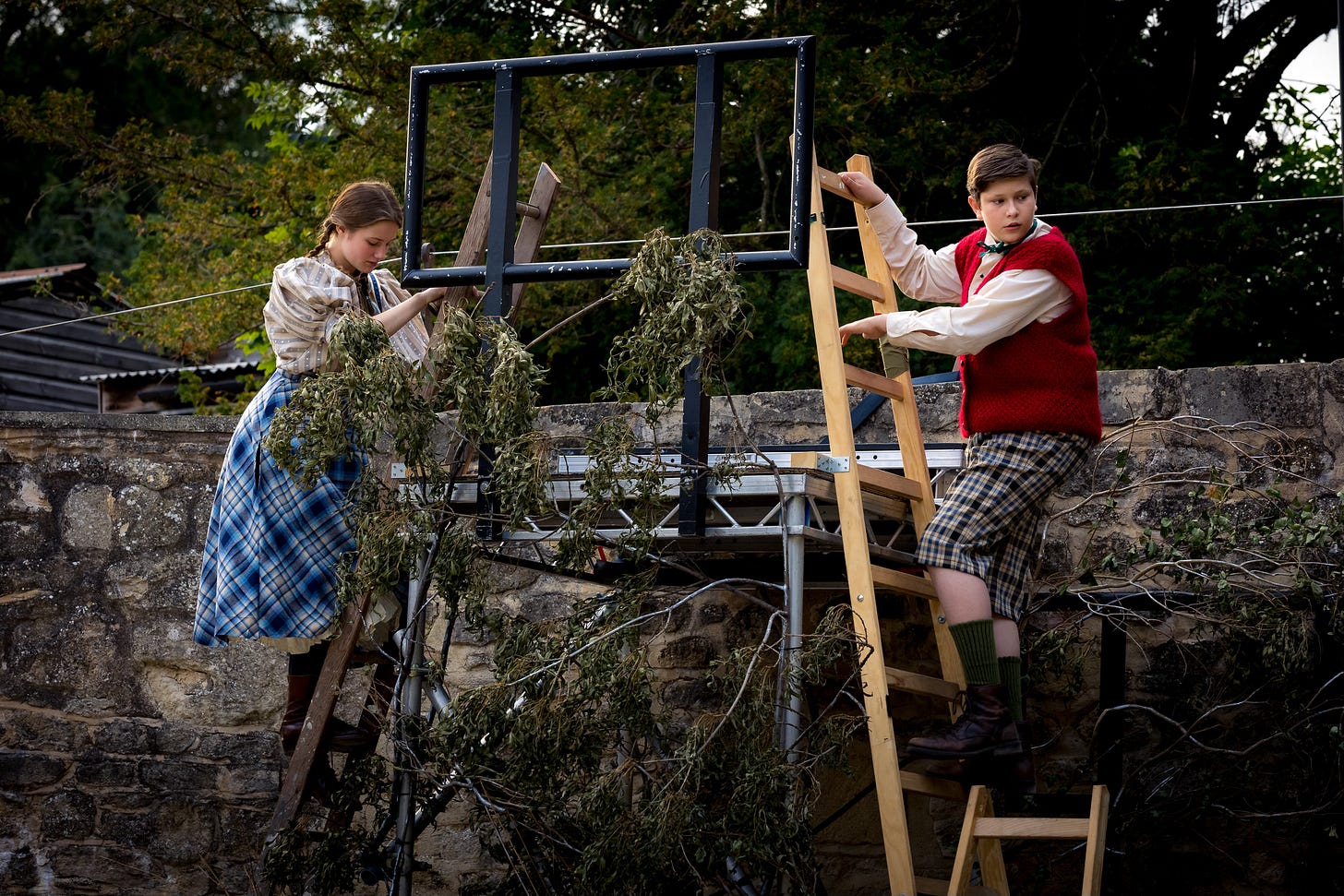
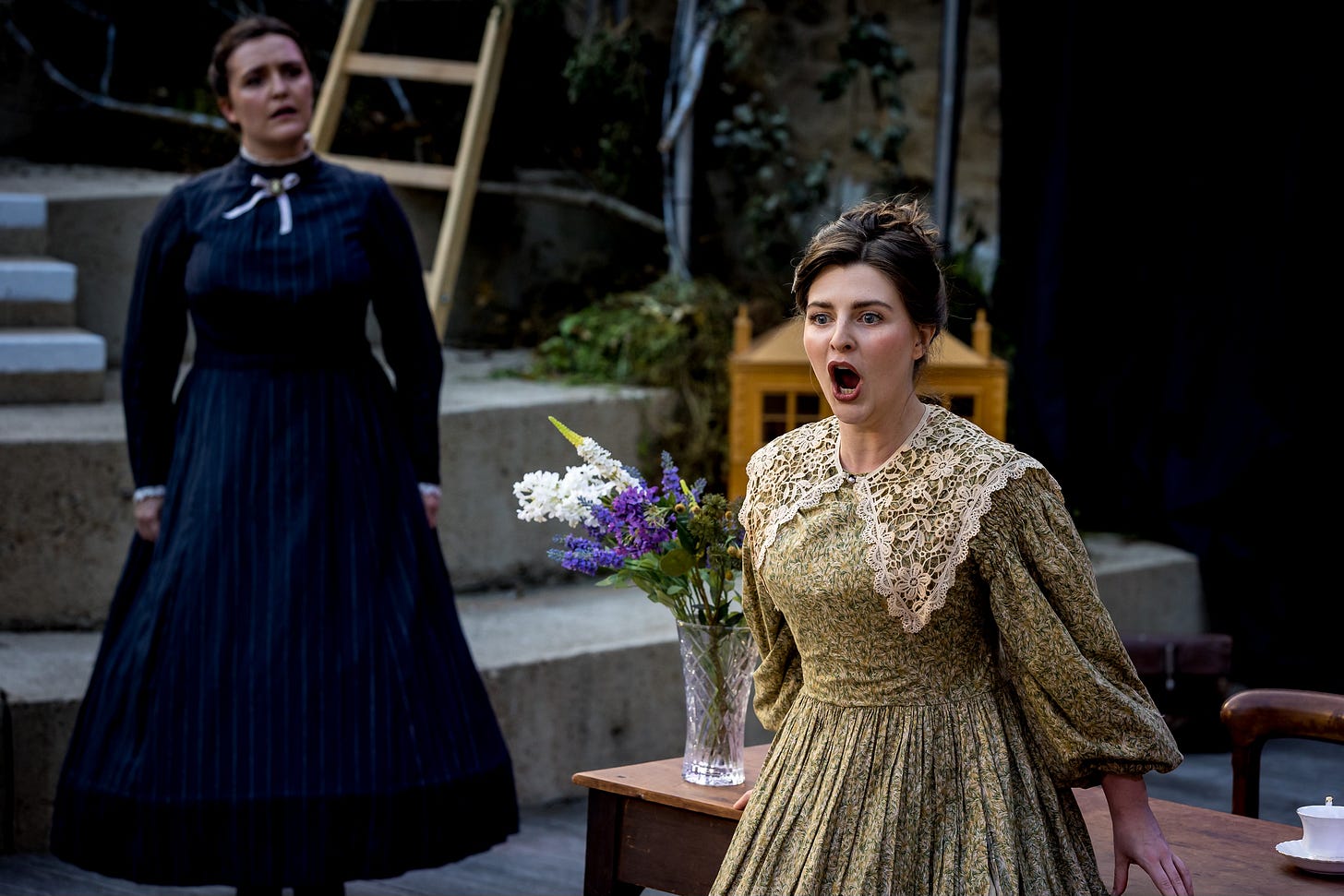
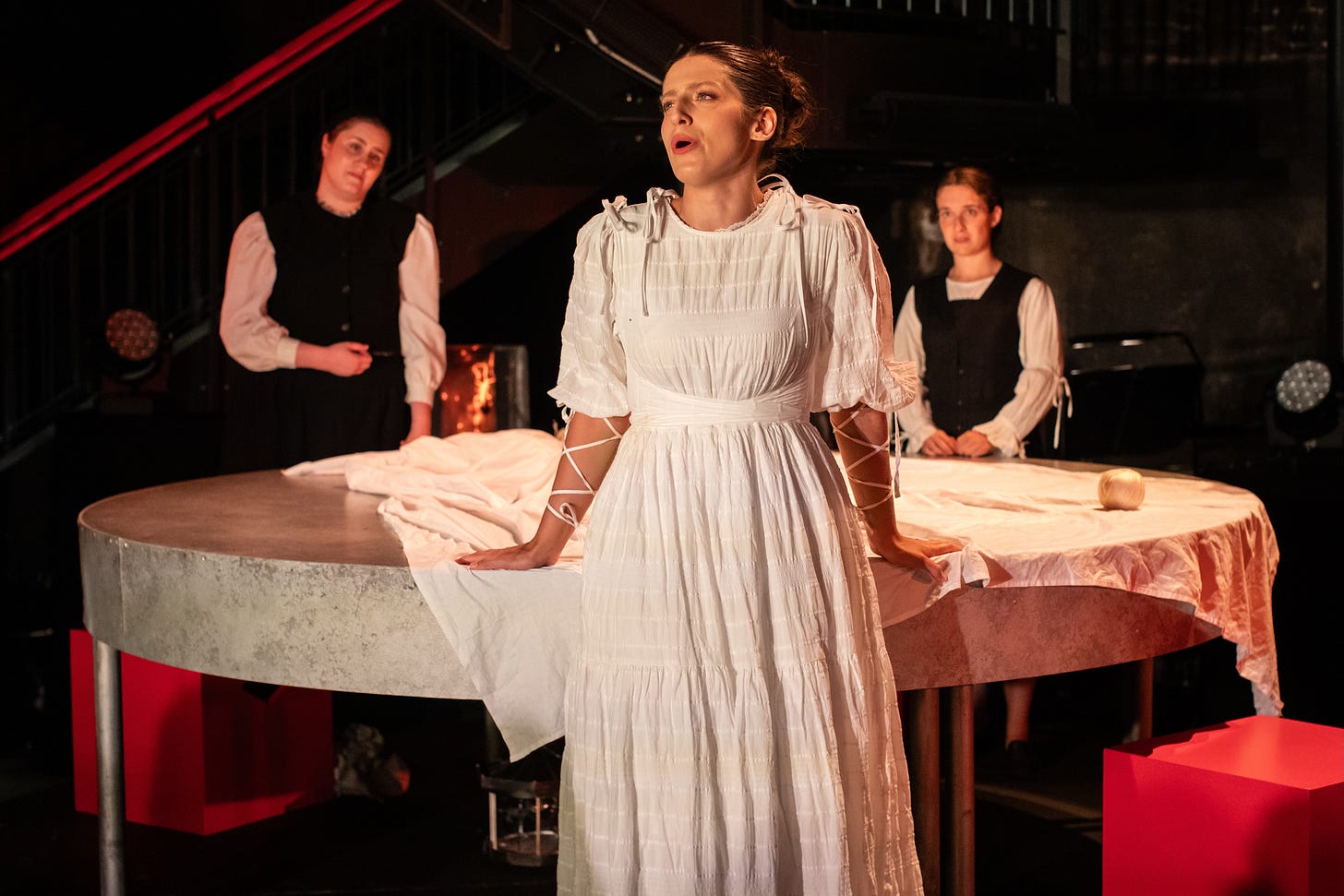
Interesting write-ups and an atmospheric venue. I understand the misgivings, it can provide queasy moments.
For some reason the ‘like’ facility is not working for me on this page.
Thank you for such a positive review of BYO's Rape of Lucretia, Hugh. I saw both casts too (but on the two nights between your visits!) and thought exactly the same. So interesting how a change of cast can change the nuances of a production so significantly. As a (relatively) new Trustee of BYO, it was a very proud week for me and I hope the company will be contributing to the future of opera for many years to come. Something I believe in passionately (as you know!)